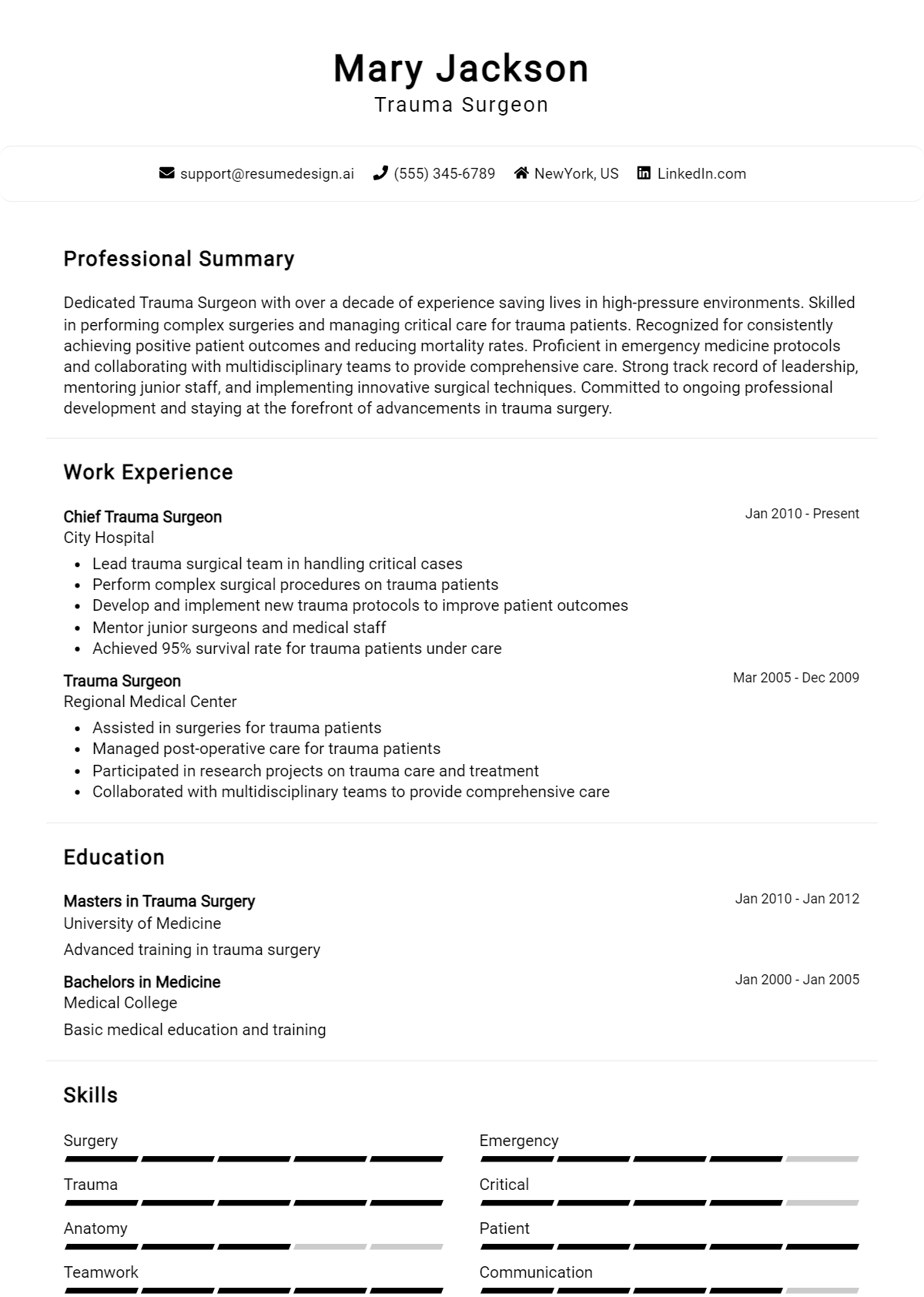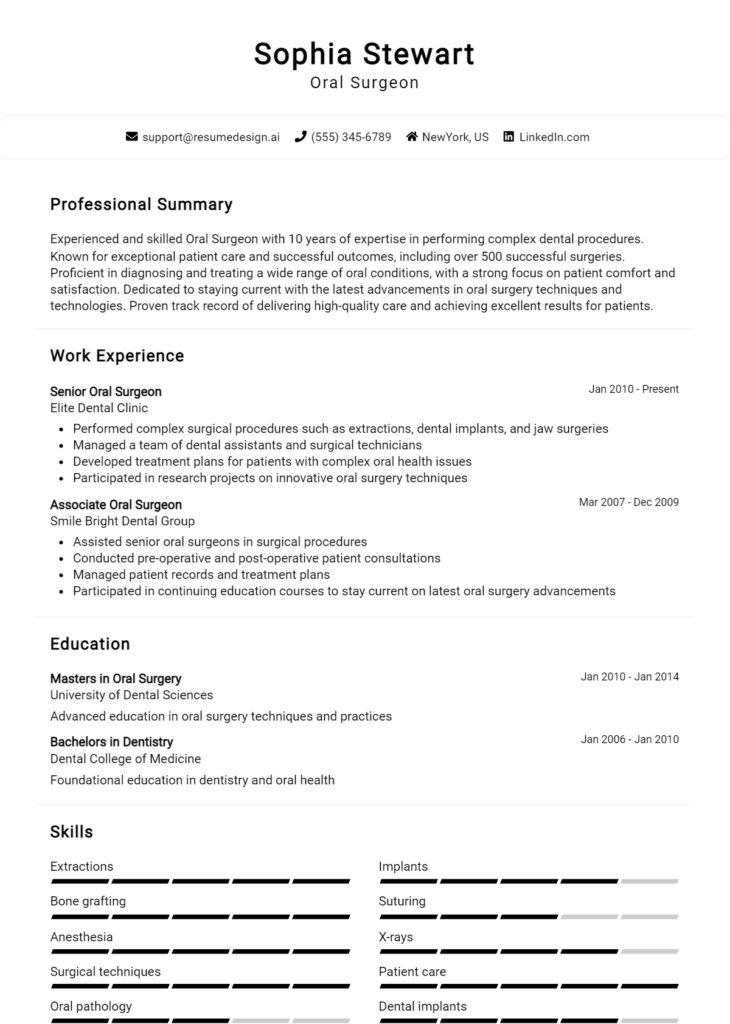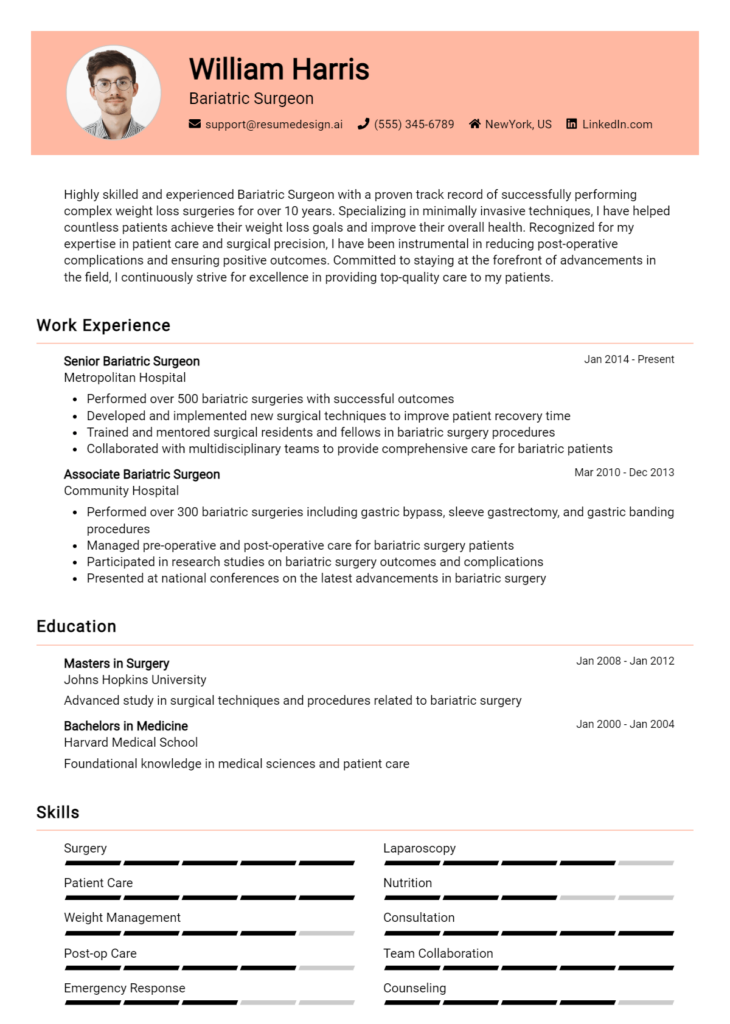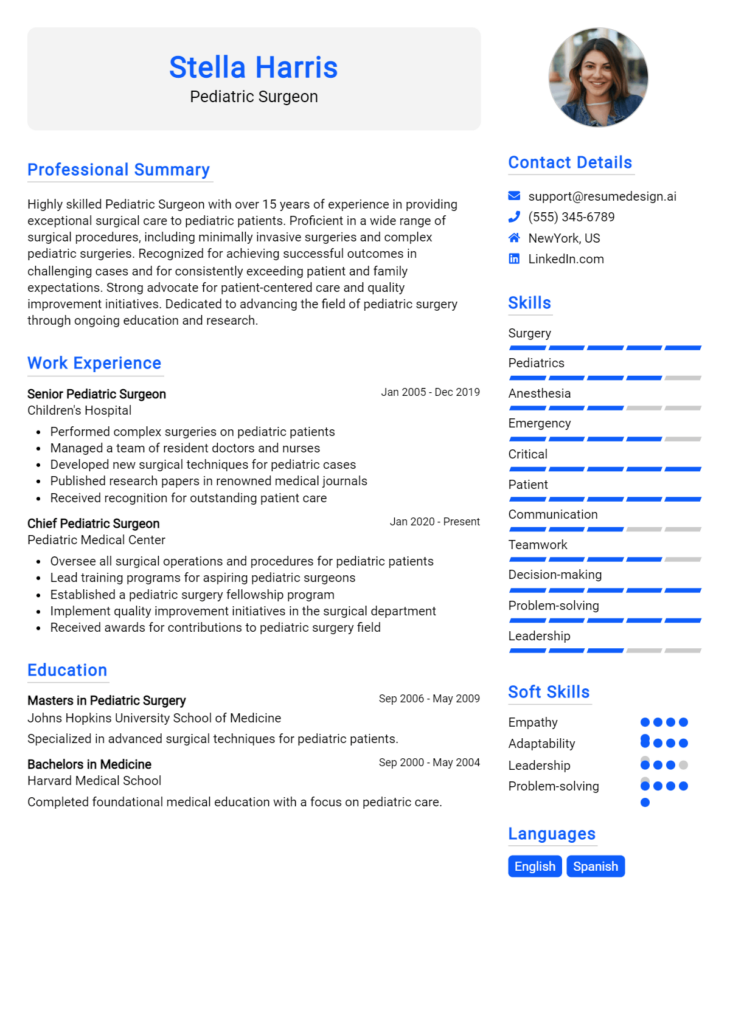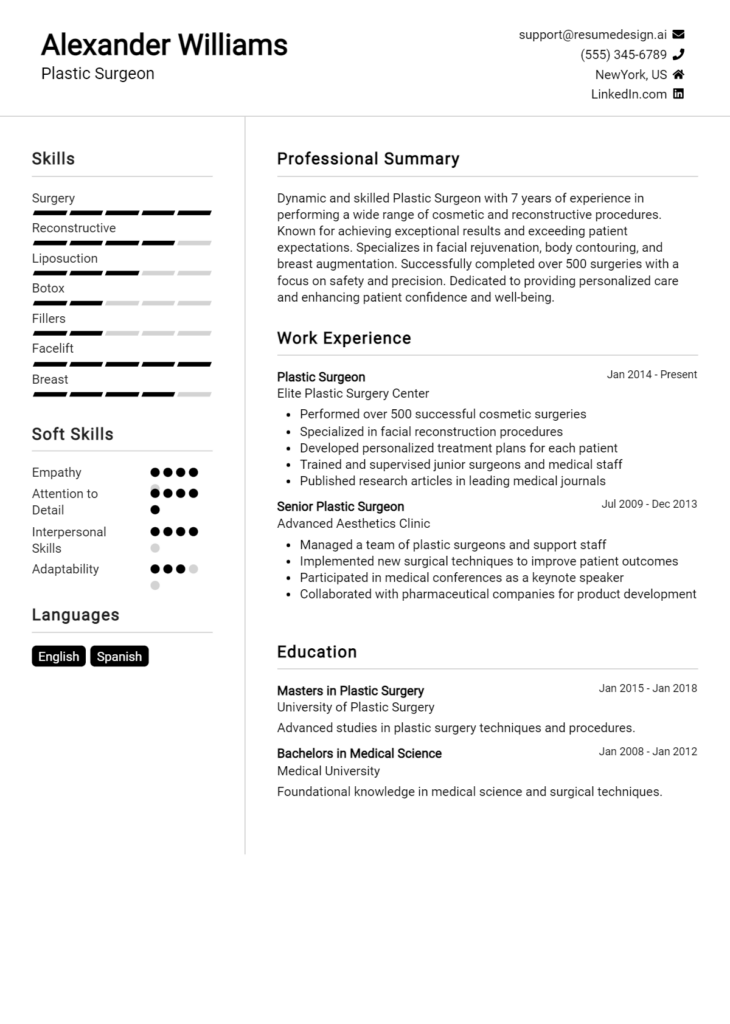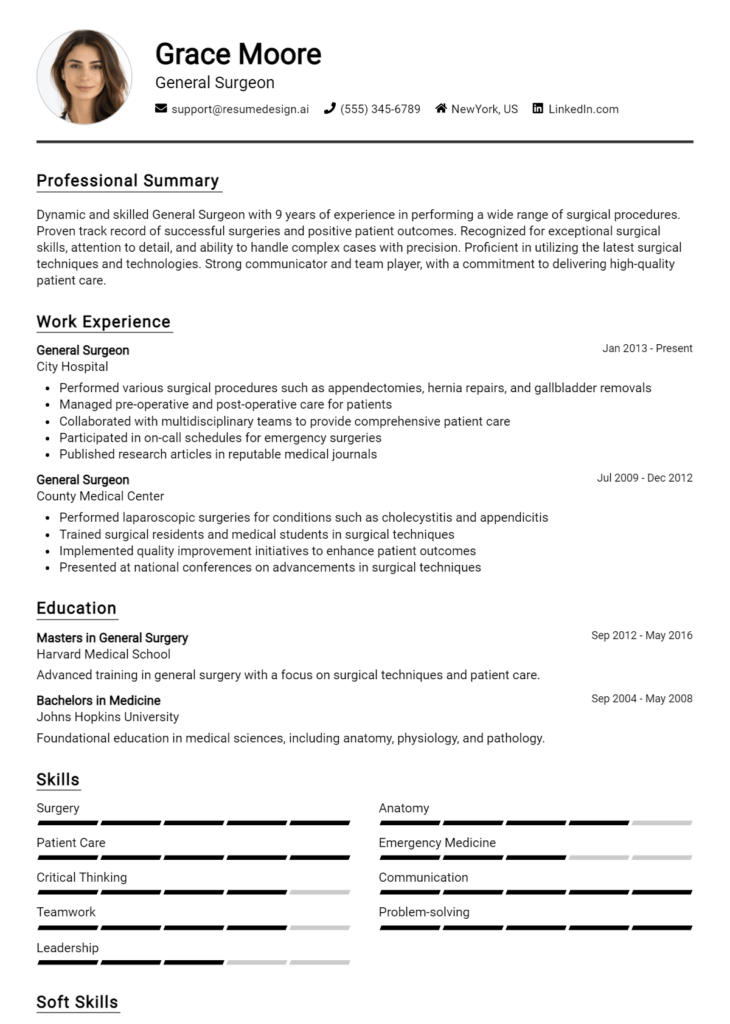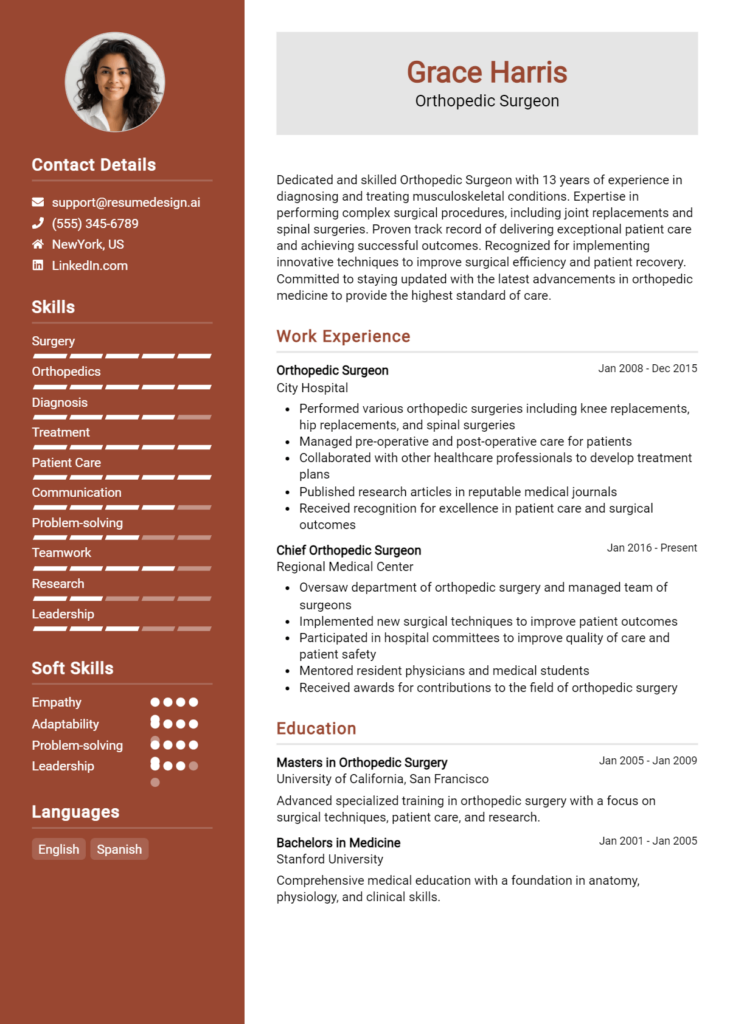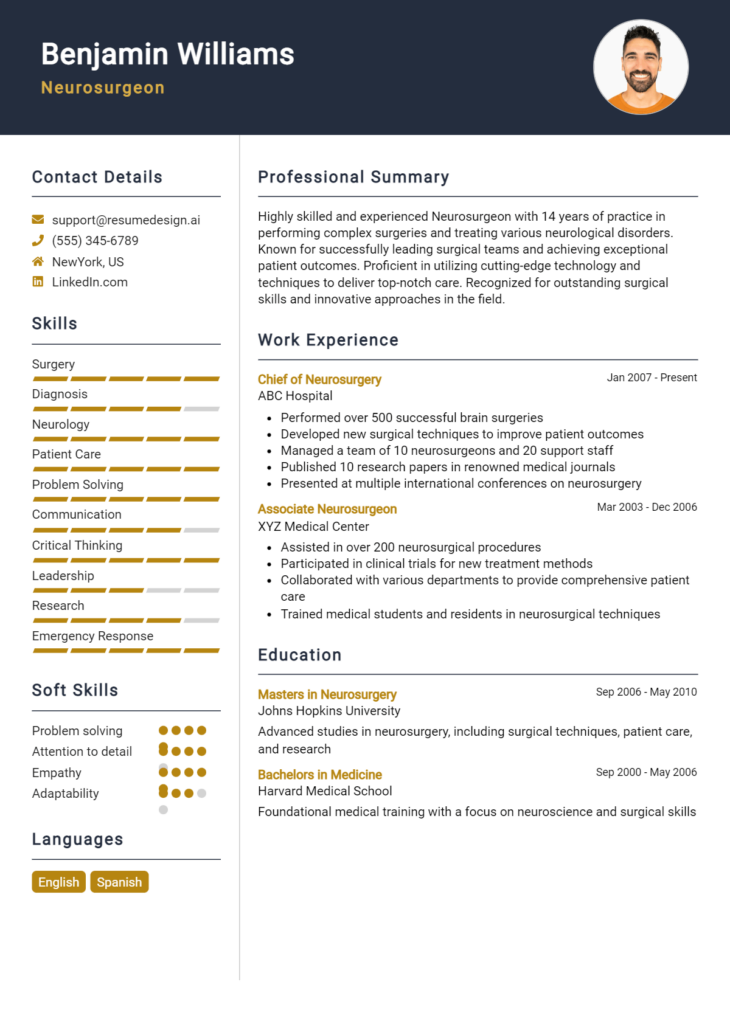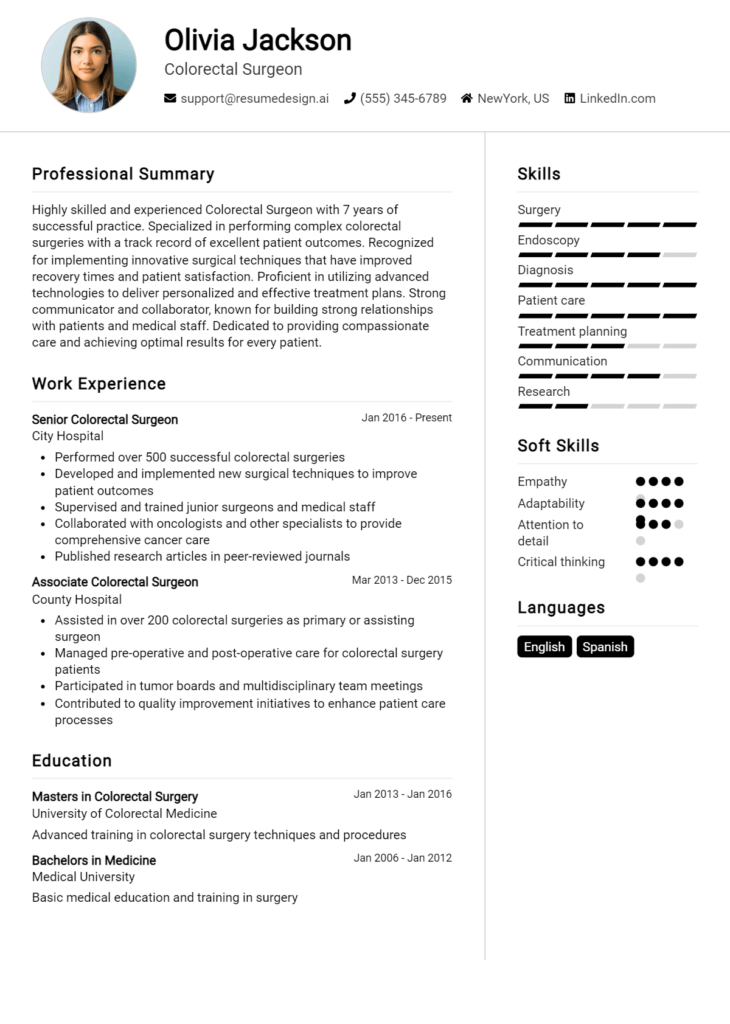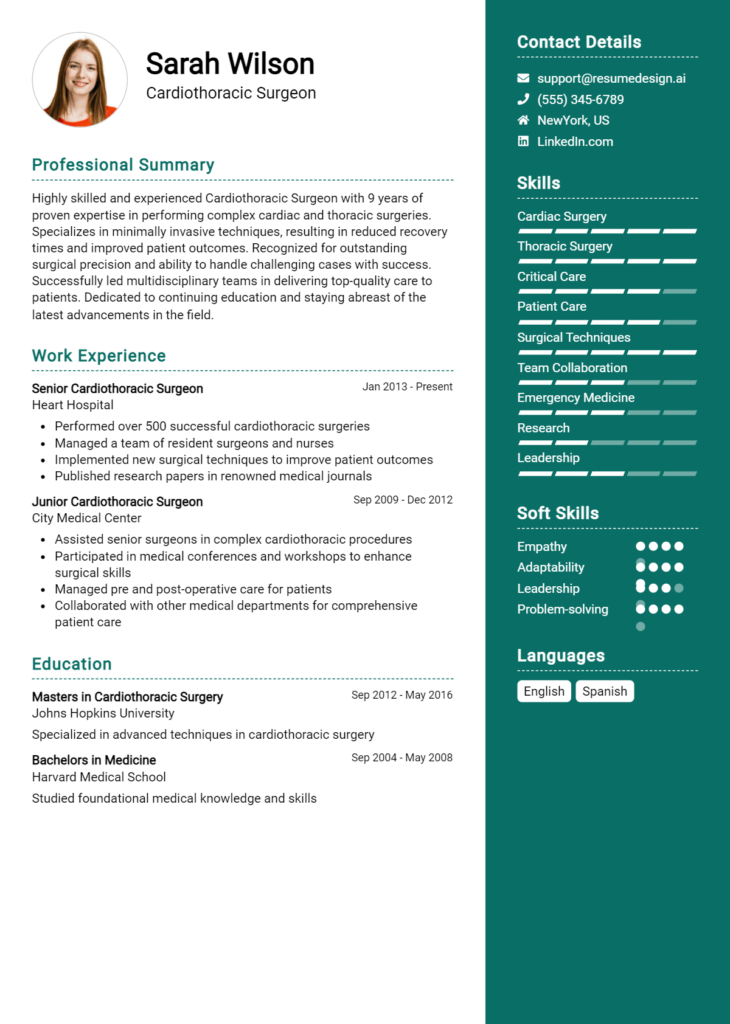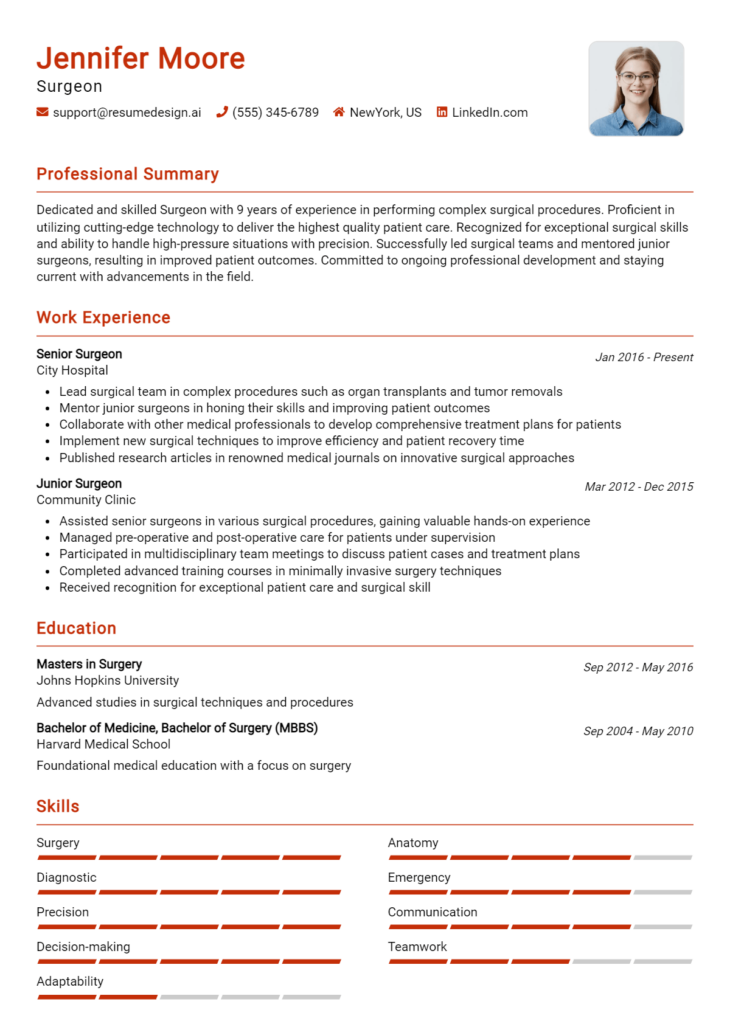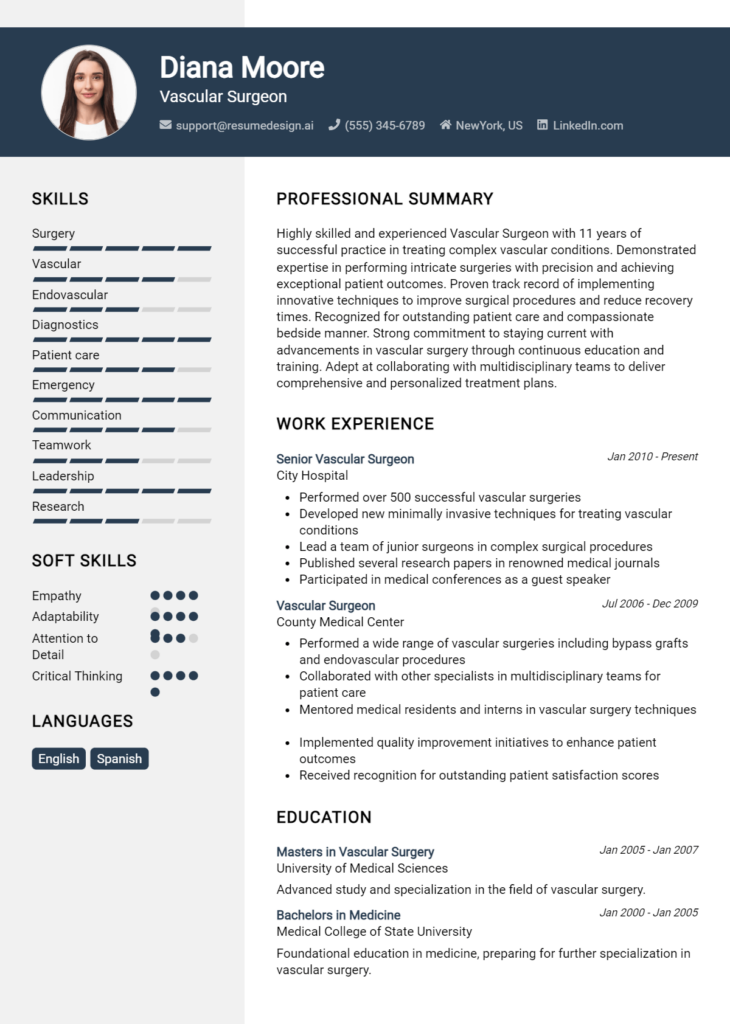Trauma Surgeon Core Responsibilities
Trauma surgeons play a critical role in emergency medicine, responsible for assessing and treating traumatic injuries. They must possess exceptional technical skills to perform complex surgical procedures, alongside strong operational and problem-solving abilities to navigate high-pressure situations. This role often bridges various departments, collaborating with anesthesiologists, nurses, and emergency room staff to ensure comprehensive patient care. A well-structured resume highlighting these qualifications is essential for demonstrating how a trauma surgeon contributes to an organization’s overall goals.
Common Responsibilities Listed on Trauma Surgeon Resume
- Perform emergency surgical procedures for trauma patients.
- Assess and stabilize critically injured patients upon arrival.
- Collaborate with multidisciplinary teams for comprehensive care.
- Utilize advanced imaging techniques to diagnose injuries.
- Develop and implement treatment plans for trauma cases.
- Conduct research and stay updated on trauma care advances.
- Educate and train medical staff on trauma protocols.
- Participate in trauma case presentations and rounds.
- Monitor patient recovery and manage post-operative care.
- Maintain accurate medical records and documentation.
- Provide support and communication to patients' families.
- Ensure compliance with healthcare regulations and standards.
High-Level Resume Tips for Trauma Surgeon Professionals
In the competitive field of trauma surgery, a well-crafted resume is essential for standing out among a pool of highly qualified candidates. Your resume often serves as your first impression with potential employers, making it crucial to effectively showcase not just your skills but also your achievements in a way that aligns with the demands of the role. A strong resume highlights your extensive medical training, surgical expertise, and the ability to thrive in high-pressure situations. This guide aims to provide practical and actionable resume tips specifically tailored for trauma surgeon professionals, helping you to present your qualifications in the best possible light.
Top Resume Tips for Trauma Surgeon Professionals
- Tailor your resume to the specific job description by incorporating relevant keywords and phrases that reflect the needs of the employer.
- Highlight your relevant clinical experience, including any fellowships, residencies, or specialized training in trauma surgery.
- Quantify your achievements by using metrics, such as the number of successful surgeries performed or improvements in patient outcomes.
- Showcase your technical skills, including proficiency in advanced surgical techniques and knowledge of the latest medical technologies.
- Include any leadership roles or committee positions you have held that demonstrate your ability to work collaboratively with multidisciplinary teams.
- Emphasize your commitment to continuing education and professional development, including any certifications or courses relevant to trauma surgery.
- Utilize clear and concise language, ensuring that your resume is easy to navigate and highlights the most important information quickly.
- Incorporate a strong summary statement at the top of your resume that encapsulates your qualifications and career goals in trauma surgery.
- Consider including a section on research or publications that showcases your contributions to the field of trauma surgery.
By implementing these tips, you can significantly enhance your resume, increasing your chances of landing a job in the trauma surgeon field. A focused and polished resume not only reflects your qualifications but also demonstrates your commitment to excellence in the demanding environment of trauma care.
Why Resume Headlines & Titles are Important for Trauma Surgeon
In the competitive field of trauma surgery, where precision and expertise are paramount, a well-crafted resume headline or title serves as the first impression a hiring manager will have of a candidate. A strong headline can immediately capture attention and succinctly summarize the candidate's key qualifications and strengths in one impactful phrase. It should be concise, relevant, and tailored specifically to the trauma surgeon position being applied for, showcasing the candidate’s unique expertise and experience in a way that resonates with the needs of the employer.
Best Practices for Crafting Resume Headlines for Trauma Surgeon
- Keep it concise: Aim for one impactful sentence or phrase.
- Be role-specific: Tailor the headline to the trauma surgery position.
- Highlight key strengths: Include critical skills, certifications, or experiences.
- Use active language: Choose dynamic words that convey confidence and proficiency.
- Avoid jargon: Use clear language that is easily understood by hiring managers.
- Focus on outcomes: Mention achievements or contributions that demonstrate success.
- Incorporate keywords: Use industry-specific terms that align with the job description.
- Show passion: Convey enthusiasm for trauma surgery and patient care.
Example Resume Headlines for Trauma Surgeon
Strong Resume Headlines
Board-Certified Trauma Surgeon with 10+ Years of Experience in High-Pressure Environments
Innovative Trauma Surgeon Specializing in Minimally Invasive Techniques and Patient Recovery
Dedicated Trauma Surgeon with Proven Track Record in Life-Saving Interventions
Weak Resume Headlines
Surgeon Looking for a Job
Medical Professional with Experience
The strong headlines are effective because they provide specific information about the candidate’s qualifications, experience, and skills that directly relate to the role of a trauma surgeon. They are tailored to highlight accomplishments and expertise, making them memorable and impactful. In contrast, the weak headlines fail to impress as they are vague and non-specific, lacking the details necessary to capture the attention of hiring managers and convey the candidate's unique value proposition in the field of trauma surgery.
Writing an Exceptional Trauma Surgeon Resume Summary
A well-crafted resume summary is crucial for a Trauma Surgeon as it serves as the first impression on hiring managers. This brief yet powerful section quickly captures attention by highlighting key skills, relevant experience, and notable accomplishments that demonstrate a candidate's qualifications for the role. An impactful summary not only outlines a surgeon's expertise in handling complex medical emergencies but also reflects their ability to perform under pressure. It should be concise, engaging, and tailored to the specific job being applied for, ensuring that it resonates with the expectations of the hiring team.
Best Practices for Writing a Trauma Surgeon Resume Summary
- Quantify achievements: Use numbers to highlight successful outcomes, such as the number of surgeries performed or patient recovery rates.
- Focus on skills: Emphasize critical skills relevant to trauma surgery, such as proficiency in emergency procedures and advanced surgical techniques.
- Tailor the summary: Customize the summary for each application to align with the job description and the specific needs of the employer.
- Highlight relevant experience: Include specific experiences that showcase expertise in trauma care and emergency response.
- Use powerful language: Choose strong, action-oriented words to convey competence and confidence.
- Limit length: Keep the summary concise, ideally within 3-5 sentences, to maintain the reader's attention.
- Showcase certifications: Mention any relevant certifications or training that enhance qualifications for the position.
- Reflect a commitment to patient care: Convey a passion for improving patient outcomes and a dedication to ongoing education in the field.
Example Trauma Surgeon Resume Summaries
Strong Resume Summaries
Board-certified Trauma Surgeon with over 10 years of experience in high-stakes emergency settings, successfully performing over 1,500 complex surgeries with a 98% patient recovery rate. Skilled in advanced laparoscopic techniques and trauma management, dedicated to improving patient outcomes through innovative practices and team collaboration.
Dynamic Trauma Surgeon with extensive expertise in critical care and emergency surgical procedures. Led a multidisciplinary team in a Level I trauma center, achieving a 30% reduction in patient recovery time through enhanced protocols and patient care initiatives. Proven track record of excellence in high-pressure environments.
Experienced Trauma Surgeon with a focus on pediatric trauma care, having treated over 600 pediatric patients successfully in emergency scenarios. Recognized for developing a streamlined triage process that improved patient intake efficiency by 25%, ensuring timely surgical interventions.
Weak Resume Summaries
Trauma Surgeon with some experience in emergency medicine. I have done various surgeries and am looking for a new opportunity to help patients.
Dedicated medical professional interested in trauma surgery. I have worked in hospitals and have skills in surgery.
The examples of strong resume summaries are considered effective because they provide quantifiable outcomes, showcase specific skills, and directly relate to the role of a Trauma Surgeon. They convey a clear message of competence and achievement in the field. In contrast, the weak resume summaries are vague and generic, lacking any measurable accomplishments or specific details that would attract the attention of hiring managers. This makes them less impactful and memorable in a competitive job market.
Work Experience Section for Trauma Surgeon Resume
The work experience section of a Trauma Surgeon resume plays a critical role in showcasing the candidate's qualifications and capabilities. It serves as a platform to highlight technical skills, such as proficiency in surgical techniques and emergency response, while also illustrating the ability to effectively manage multidisciplinary teams under pressure. This section should not only detail job responsibilities but also quantify achievements, demonstrating a commitment to delivering high-quality patient care in alignment with industry standards. By carefully curating this section, candidates can effectively present their contributions to improving patient outcomes and fostering collaboration in high-stakes environments.
Best Practices for Trauma Surgeon Work Experience
- Utilize action verbs to describe responsibilities and achievements clearly.
- Quantify results where possible, such as the number of surgeries performed or improvements in patient recovery times.
- Highlight leadership roles in surgical teams or emergency response situations.
- Include specific technologies and techniques used to demonstrate technical expertise.
- Emphasize collaboration with other medical professionals to showcase teamwork skills.
- Align experiences with industry best practices and standards to reflect current knowledge.
- Focus on patient outcomes and safety improvements as key metrics of success.
- Tailor each experience to the job description to enhance relevancy.
Example Work Experiences for Trauma Surgeon
Strong Experiences
- Successfully led a trauma surgical team in over 300 high-stakes operations, achieving a 95% patient survival rate.
- Implemented a new triage protocol that reduced patient wait times by 40% during peak trauma hours.
- Collaborated with a multidisciplinary team to develop a comprehensive trauma care pathway, which improved patient recovery times by 30%.
- Conducted over 100 educational workshops for medical residents, enhancing their surgical skills and knowledge in trauma care.
Weak Experiences
- Assisted in surgeries and other medical procedures.
- Worked with a team on various surgical cases.
- Participated in hospital meetings and training sessions.
- Was responsible for patient care in the emergency department.
The examples provided illustrate the importance of specificity and quantifiable achievements in the work experience section. Strong experiences offer concrete metrics and demonstrate leadership and collaboration, making them impactful. In contrast, weak experiences lack detail and fail to convey the candidate's contributions or expertise, making them less compelling to potential employers. By focusing on measurable outcomes and technical skills, candidates can effectively differentiate themselves in the competitive field of trauma surgery.
Education and Certifications Section for Trauma Surgeon Resume
The education and certifications section of a Trauma Surgeon resume is crucial as it serves as a testament to the candidate's academic accomplishments and professional qualifications. In such a specialized and demanding field, showcasing a strong educational background, relevant certifications, and a commitment to continuous learning is essential. This section not only highlights the candidate's expertise but also underscores their dedication to staying current with the latest advancements in trauma care. Providing detailed information about relevant coursework, specialized training, and industry-recognized certifications can significantly enhance the candidate's credibility and demonstrate their alignment with the requirements of the trauma surgeon role.
Best Practices for Trauma Surgeon Education and Certifications
- Include advanced degrees such as MD or DO along with the specialization in trauma surgery.
- List board certifications, particularly those from recognized organizations like the American Board of Surgery.
- Highlight relevant fellowship training in trauma surgery or critical care.
- Detail any additional certifications, such as Advanced Trauma Life Support (ATLS) or Pediatric Advanced Life Support (PALS).
- Incorporate relevant coursework during medical education that emphasizes trauma, emergency medicine, or surgical techniques.
- Ensure all certifications are up-to-date and include the expiration dates where applicable.
- Use specific titles for certifications to avoid ambiguity and enhance clarity.
- Consider adding any ongoing education efforts such as workshops, seminars, or conferences attended related to trauma care.
Example Education and Certifications for Trauma Surgeon
Strong Examples
- Doctor of Medicine (MD), Harvard Medical School, 2012
- Board Certified in General Surgery, American Board of Surgery, 2014
- Fellowship in Trauma Surgery, University of California, San Francisco, 2015
- Advanced Trauma Life Support (ATLS) Certification, American College of Surgeons, 2023
Weak Examples
- Bachelor’s Degree in History, State University, 2008
- Certification in Basic Life Support (BLS), 2010 (no longer current)
- General Surgery Residency, Unaccredited Institution, 2013
- Online Course in First Aid, 2019 (not specific to trauma care)
The strong examples are considered robust because they directly relate to the essential qualifications and training necessary for a Trauma Surgeon, showcasing advanced degrees, board certifications, and relevant fellowships. In contrast, the weak examples highlight irrelevant or outdated qualifications that do not align with the requirements of a trauma surgery role, such as unrelated degrees and expired certifications that do not demonstrate current competency in trauma care.
Top Skills & Keywords for Trauma Surgeon Resume
In the highly demanding field of trauma surgery, possessing the right skills is paramount not only for securing a job but also for excelling in a high-pressure environment. A well-crafted resume that highlights relevant skills can set a trauma surgeon apart from other candidates, making it essential to carefully curate this section. Trauma surgeons must demonstrate proficiency in both technical and interpersonal skills, as they are required to make quick decisions, perform intricate procedures, and communicate effectively with patients and colleagues. By showcasing a balanced mix of hard and soft skills, candidates can illustrate their readiness to handle the complexities of trauma care and their commitment to patient outcomes.
Top Hard & Soft Skills for Trauma Surgeon
Soft Skills
- Strong communication skills
- Ability to work under pressure
- Team collaboration
- Problem-solving skills
- Empathy and compassion
- Attention to detail
- Leadership qualities
- Adaptability and flexibility
- Time management
- Critical thinking
Hard Skills
- Surgical techniques and procedures
- Emergency medical response
- Trauma assessment and diagnosis
- Knowledge of anatomy and physiology
- Proficiency in medical technology and tools
- Patient care management
- Anesthesia administration
- Infection control practices
- Proficiency in electronic health records (EHR)
- Research and data analysis
For more insights on effective skills and showcasing work experience in your resume, consider exploring additional resources to enhance your application.
Stand Out with a Winning Trauma Surgeon Cover Letter
Dear [Hiring Manager's Name],
I am writing to express my interest in the Trauma Surgeon position at [Hospital/Institution Name], as advertised on [where you found the job posting]. With over [X years] of specialized experience in trauma surgery, along with my commitment to providing high-quality patient care, I am excited about the opportunity to contribute to your esteemed medical team. My extensive training and hands-on experience in emergency surgical procedures have equipped me with the skills necessary to thrive in fast-paced and high-pressure environments, ensuring optimal outcomes for critically injured patients.
Throughout my career, I have had the privilege of working in diverse clinical settings, including Level I trauma centers, where I honed my abilities in rapid assessment and intervention. My proficiency in advanced surgical techniques, coupled with a strong foundation in trauma management protocols, allows me to make informed decisions quickly. I am particularly proud of my role in developing and implementing a [specific program or initiative], which significantly improved patient recovery times and overall satisfaction. I am dedicated to continuous professional development, regularly attending workshops and conferences to stay abreast of the latest advancements in trauma care.
In addition to my technical expertise, I believe that effective communication and teamwork are crucial in a trauma setting. I have successfully collaborated with multidisciplinary teams to ensure comprehensive care for patients, advocating for their needs while fostering a supportive environment for both staff and families. My commitment to mentorship has also enabled me to guide junior surgeons and residents, sharing knowledge and promoting best practices in trauma management.
I am eager to bring my expertise and passion for trauma surgery to [Hospital/Institution Name] and contribute to your mission of delivering exceptional patient care. Thank you for considering my application. I look forward to the opportunity to discuss how my background, skills, and enthusiasms align with the goals of your team.
Sincerely,
[Your Name]
[Your Contact Information]
[Your LinkedIn Profile or Professional Website]
Common Mistakes to Avoid in a Trauma Surgeon Resume
Crafting a resume for a trauma surgeon position requires precision and attention to detail, much like the job itself. However, many candidates make common mistakes that can detract from their qualifications and diminish their chances of landing an interview. By avoiding these pitfalls, you can create a standout resume that effectively showcases your skills and experience in the field of trauma surgery.
Overloading with Medical Jargon: While it's important to demonstrate your knowledge, using excessive medical terminology can alienate hiring managers who may not be familiar with every term.
Neglecting Soft Skills: Trauma surgery is not only about technical expertise; interpersonal skills are crucial. Failing to highlight qualities like teamwork, communication, and empathy can be a missed opportunity.
Omitting Relevant Experience: Some candidates may focus on general surgical experience while neglecting to emphasize trauma-specific roles or achievements that are critical for the position.
Using a Generic Template: Submitting a one-size-fits-all resume can make you appear unprofessional. Tailor your resume to reflect the specific requirements and values of the trauma surgery role you are applying for.
Ignoring Quantifiable Achievements: Stating responsibilities without measurable outcomes can weaken your resume. Use data and specific examples to illustrate your impact, such as the number of surgeries performed or improvements in patient outcomes.
Failing to Update Licenses and Certifications: Ensure that all relevant certifications, licenses, and continuing education are current. Listing expired credentials may raise red flags for employers.
Poor Formatting: A cluttered or confusing layout can make it difficult for hiring managers to quickly assess your qualifications. Use clear headings, bullet points, and consistent formatting for a professional appearance.
Not Including Continuing Education: Trauma surgery is an evolving field. Omitting recent training or courses taken can suggest a lack of commitment to professional development and staying current with medical advancements.
Conclusion
As a trauma surgeon, your expertise in managing acute injuries and complex surgical situations is crucial in saving lives. This article has covered the essential skills and qualifications necessary for this demanding role, including advanced surgical techniques, decision-making under pressure, and the ability to work collaboratively within a multidisciplinary team.
In addition, we discussed the importance of continuous education and training to stay updated with the latest medical advancements and practices. A compelling resume is vital to showcase your qualifications, experience, and unique skills that set you apart from other candidates.
Now is the time to ensure your Trauma Surgeon resume reflects your professional achievements and capabilities. Take advantage of the available resources to enhance your application materials:
- Explore resume templates to find a design that suits your style.
- Use the resume builder for a step-by-step guide in creating a polished resume.
- Review resume examples to gain inspiration from successful trauma surgeons.
- Don’t forget to craft an impactful cover letter using our cover letter templates to complement your resume.
Take the next step in your career today—review your resume and make sure it accurately represents your skills and experiences as a trauma surgeon.

